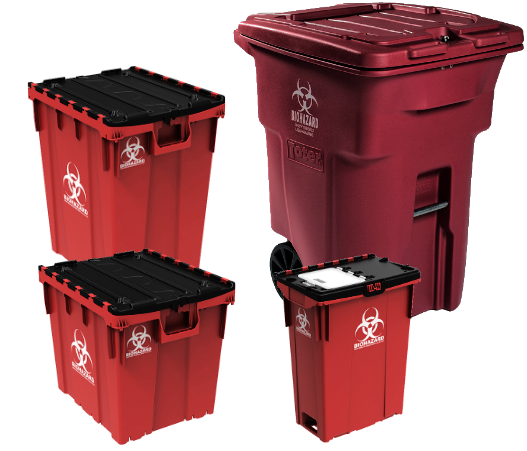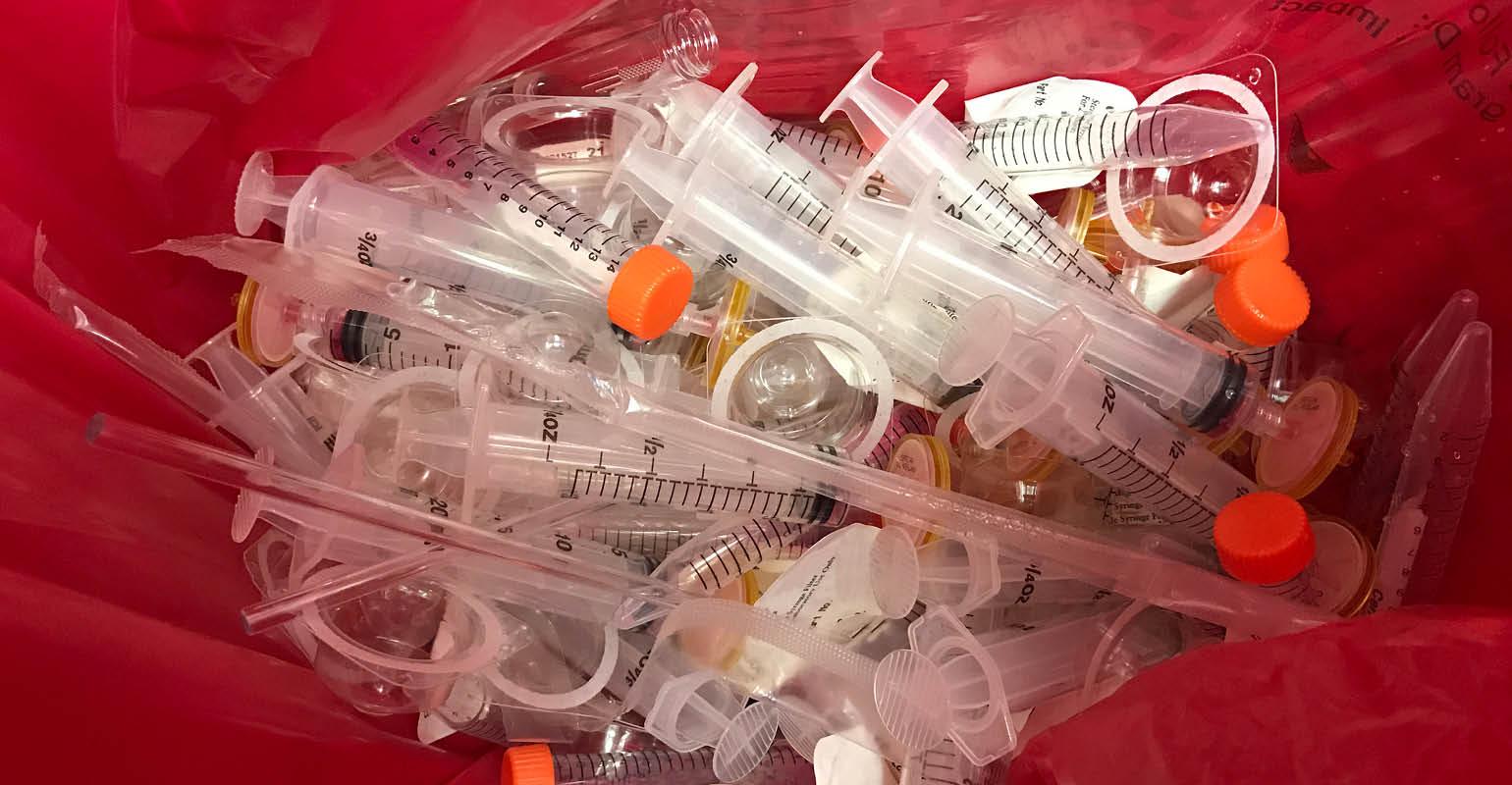Shielding Health And Wellness: Expert Medical Waste Removal Services for a Clean Atmosphere
Shielding Health And Wellness: Expert Medical Waste Removal Services for a Clean Atmosphere
Blog Article
The Significance of Correct Medical Waste Disposal: A Guide for Medical Care Facilities
Correct medical waste disposal is a crucial aspect of healthcare facility monitoring, making certain the safety and well-being of clients, staff, and the atmosphere. From understanding the various classifications of clinical waste to complying with regulatory requirements, health care centers must adopt efficient waste segregation techniques and pick suitable disposal approaches.
Recognizing Medical Waste Categories
Recognizing medical waste groups is essential for appropriate disposal in medical care centers. Medical waste is a broad term that incorporates different types of waste produced in health care settings, such as facilities, healthcare facilities, and research laboratories. Categorizing medical waste aids guarantee that it is dealt with, kept, and disposed of securely and based on relevant policies.
There are numerous groups of clinical waste that healthcare centers require to be familiar with. These categories include transmittable waste, sharps waste, pharmaceutical waste, chemical waste, and radioactive waste (medical waste disposal services with WasteX). Each group has specific features and calls for various disposal techniques to decrease the risk of damage to healthcare workers, clients, and the atmosphere
Infectious waste, as an example, describes waste contaminated with potentially transmittable materials, such as blood, body fluids, and tissues. Sharps waste consists of needles, syringes, and various other sharp things that can cause injury or transmit infections. Pharmaceutical waste is composed of ended or unused drugs, while chemical waste includes dangerous chemicals used in medical procedures. Lastly, radioactive waste includes products contaminated with radioactive compounds, such as nuclear medication materials.
Conformity With Regulatory Requirements
Health care facilities must guarantee conformity with regulatory demands for appropriate clinical waste disposal. Governing bodies, such as the Environmental Security Agency (EPA) and the Occupational Safety and Health Management (OSHA), have established policies and standards to safeguard public health and the atmosphere. These laws detail the proper handling, storage space, transport, and disposal of clinical waste.
Compliance with governing demands is essential for medical care centers to stay clear of legal fines, reputational damages, and potential harm to human wellness and the environment. Failure to conform with these policies can lead to fines, lawsuits, and also the suspension or retraction of running licenses.
To guarantee conformity, health care centers must establish extensive waste management programs that consist of staff training, appropriate waste partition, and using proper containers and tags. Normal audits and examinations should also be carried out to recognize any kind of non-compliance problems and address them promptly.
It is necessary for healthcare centers to keep up to day with changes in laws and update their waste monitoring methods as necessary. This can be accomplished by proactively keeping track of updates from governing bodies and joining training programs and workshops.
Executing Efficient Waste Partition Practices
To make certain correct medical waste disposal, health care facilities should apply reliable waste segregation practices. Waste segregation is an essential step in the total waste administration procedure, as it helps minimize the risk of infection, avoids cross-contamination, and makes certain the safe disposal of various kinds of waste. Effective waste partition practices include separating clinical waste right into different groups based on its attributes and prospective dangers.
One typical practice is the segregation of sharps waste, such as scalpels and needles, from other kinds of clinical waste. Sharps waste ought to be positioned in puncture-resistant containers to avoid injuries and prospective infections. Additionally, hazardous waste, such as chemicals and pharmaceuticals, ought to be separated from basic clinical waste to avoid environmental contamination.
Proper labeling and color-coding of waste containers are crucial for effective waste segregation. Clear and visible tags need to be put on each container to suggest the kind of waste it has and any special handling needs - medical waste disposal services with WasteX. In addition, color-coding can be used to differentiate in between various waste groups, making it easier for healthcare team to identify and dispose of waste properly
Normal training and education and learning for healthcare staff is critical for the effective implementation of waste partition practices. Employee need to be enlightened on the different waste classifications, correct segregation methods, and the importance of adhering to waste management procedures. This will certainly assist ensure compliance and consistency in waste partition methods throughout the center.
Finding Appropriate Disposal Approaches
Appropriate option of proper disposal techniques is necessary in making sure the risk-free and ecologically liable monitoring of clinical waste in healthcare centers. Health care facilities create a range of clinical waste, including sharps, infectious waste, pharmaceutical waste, and chemical waste - medical waste removal. Each kind of waste requires details disposal methods to decrease the threat of contamination, injury, and environmental harm
One common disposal approach for medical waste is incineration. Incineration entails the controlled burning of waste at high temperature levels.

Chemical disinfection is one more approach made use of for sure kinds of medical waste, such as pharmaceutical waste. This technique utilizes chemicals to neutralize or ruin impurities. look at this site It is important to pick chemicals that are safe and eco pleasant.
In some situations, landfill disposal may be appropriate for non-hazardous medical waste (medical waste disposal services with WasteX). Nevertheless, appropriate segregation and product packaging are essential to avoid leakage or contamination.
Ultimately, healthcare centers need to meticulously review the qualities of their clinical waste and choose suitable disposal techniques that prioritize safety and security, ecological defense, and regulatory compliance. Routine training and tracking are essential to make certain that health care staff complies with appropriate disposal procedures.

Training and Educating Team on Appropriate Disposal Procedures
Team education and training play a crucial duty in making sure the correct disposal of medical waste in healthcare centers. It is important that all personnel, consisting of doctors, registered nurses, specialists, and assistance staff, obtain comprehensive training on appropriate disposal treatments. This training should cover the various kinds of clinical waste, their possible risks, and the suitable techniques for dealing with, segregating, and dealing with them.
Among the key objectives of personnel Get the facts education and training is to make certain that all health care experts comprehend the significance of appropriate disposal procedures and the possible consequences of inappropriate waste administration. They require to be conscious of the threats related to medical waste, such as the transmission of infections and the contamination of the setting. medical waste removal service. By recognizing these dangers, employee will certainly be much more determined to follow proper disposal protocols and take the needed preventative measures to shield themselves, their associates, and the area
Training need to also cover the use of individual safety equipment (PPE) and the appropriate techniques for taking care of medical waste. Team member must be informed on just how to recognize and set apart different types of waste, such as sharps, infectious waste, and harmful chemicals. They must also be trained on the proper usage of waste containers, such as sharps containers and biohazard bags, in addition to the relevance of labeling and sealing these containers appropriately.
Furthermore, team education and learning and training ought to consist of routine updates and correspondence course to make certain that health care experts stay notified concerning the current guidelines and ideal methods in clinical garbage disposal. This ongoing education is essential to maintain a high degree of recognition and compliance amongst team members.
Final Thought
To conclude, correct medical garbage disposal is of utmost value for health care facilities. Recognizing the various categories of medical waste and following regulative needs guarantees the security and wellness of both health care employees and the general public. go to this site Carrying out effective waste segregation techniques and selecting suitable disposal methods are important in protecting against the spread of transmittable conditions and shielding the atmosphere. Training and informing staff on correct disposal treatments is essential for maintaining a tidy and safe health care facility.
From comprehending the various groups of medical waste to complying with regulative demands, health care facilities should adopt effective waste segregation techniques and select proper disposal techniques. These categories include transmittable waste, sharps waste, pharmaceutical waste, chemical waste, and radioactive waste.To guarantee proper clinical waste disposal, healthcare facilities have to implement effective waste partition practices. Waste partition is an essential action in the overall waste management procedure, as it assists decrease the risk of infection, stops cross-contamination, and guarantees the risk-free disposal of different kinds of waste. Healthcare centers generate a selection of clinical waste, consisting of sharps, transmittable waste, pharmaceutical waste, and chemical waste.
Report this page